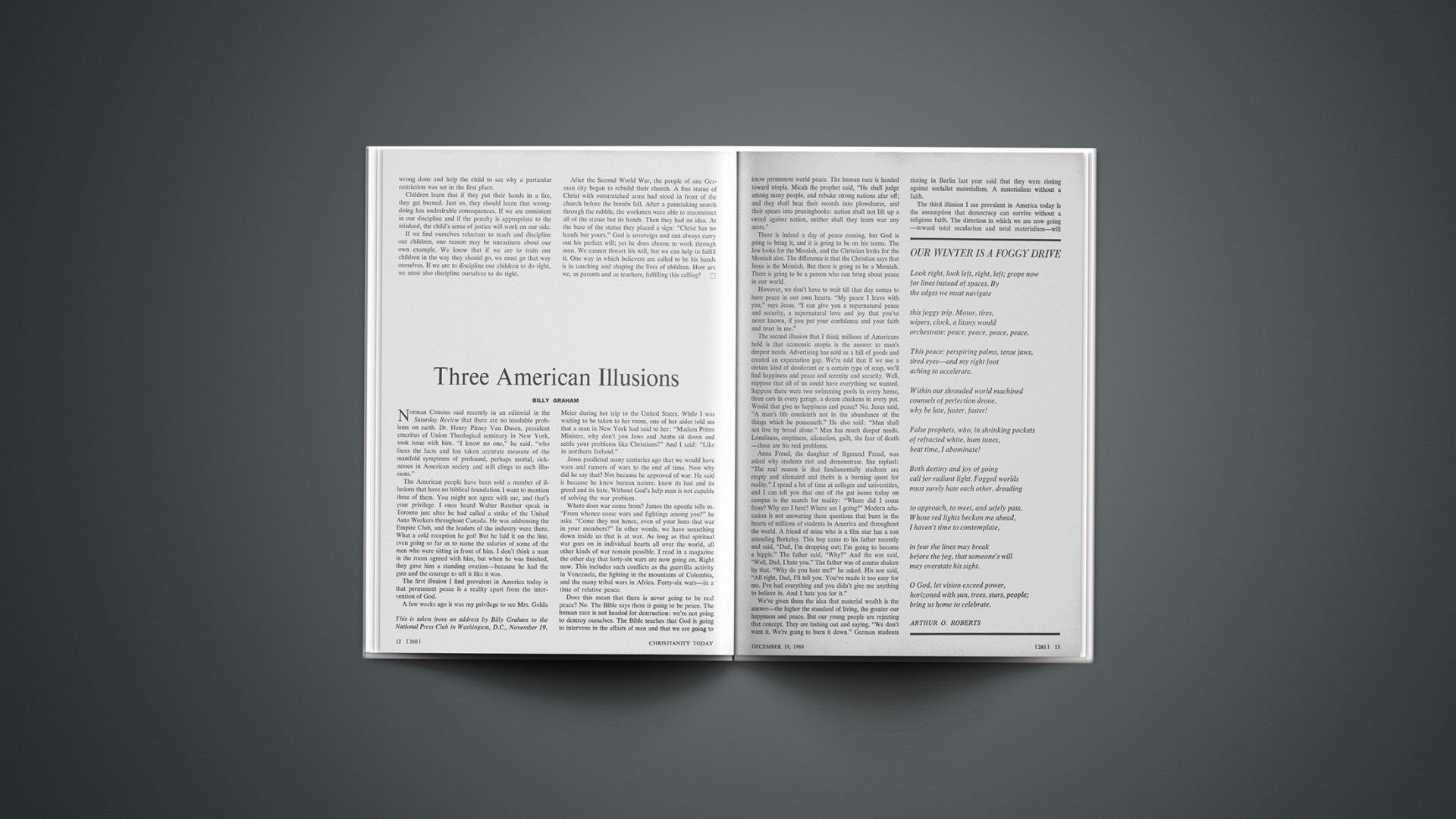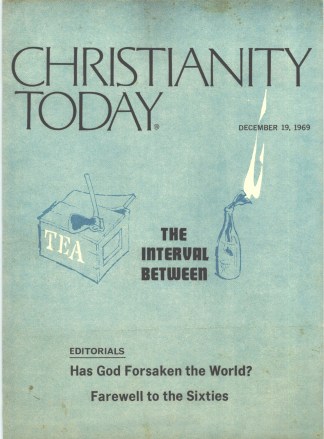Norman Cousins said recently in an editorial in the Saturday Review that there are no insoluble problems on earth. Dr. Henry Pitney Van Dusen, president emeritus of Union Theological seminary in New York, took issue with him. “I know no one,” he said, “who faces the facts and has taken accurate measure of the manifold symptoms of profound, perhaps mortal, sicknesses in American society and still clings to such illusions.”
The American people have been sold a number of illusions that have no biblical foundation. I want to mention three of them. You might not agree with me, and that’s your privilege. I once heard Walter Reuther speak in Toronto just after he had called a strike of the United Auto Workers throughout Canada. He was addressing the Empire Club, and the leaders of the industry were there. What a cold reception he got! But he laid it on the line, even going so far as to name the salaries of some of the men who were sitting in front of him. I don’t think a man in the room agreed with him, but when he was finished, they gave him a standing ovation—because he had the guts and the courage to tell it like it was.
The first illusion I find prevalent in America today is that permanent peace is a reality apart from the intervention of God.
A few weeks ago it was my privilege to see Mrs. Golda Meier during her trip to the United States. While I was waiting to be taken to her room, one of her aides told me that a man in New York had said to her: “Madam Prime Minister, why don’t you Jews and Arabs sit down and settle your problems like Christians?” And I said: “Like in northern Ireland.”
Jesus predicted many centuries ago that we would have wars and rumors of wars to the end of time. Now why did he say that? Not because he approved of war. He said it because he knew human nature, knew its lust and its greed and its hate. Without God’s help man is not capable of solving the war problem.
Where does war come from? James the apostle tells us. “From whence come wars and fightings among you?” he asks. “Come they not hence, even of your lusts that war in your members?” In other words, we have something down inside us that is at war. As long as that spiritual war goes on in individual hearts all over the world, all other kinds of war remain possible. I read in a magazine the other day that forty-six wars are now going on. Right now. This includes such conflicts as the guerrilla activity in Venezuela, the fighting in the mountains of Colombia, and the many tribal wars in Africa. Forty-six wars—in a time of relative peace.
Does this mean that there is never going to be real peace? No. The Bible says there is going to be peace. The human race is not headed for destruction: we’re not going to destroy ourselves. The Bible teaches that God is going to intervene in the affairs of men and that we are going to know permanent world peace. The human race is headed toward utopia. Micah the prophet said, “He shall judge among many people, and rebuke strong nations afar off; and they shall beat their swords into plowshares, and their spears into pruninghooks: nation shall not lift up a sword against nation, neither shall they learn war any more.”
There is indeed a day of peace coming, but God is going to bring it, and it is going to be on his terms. The Jew looks for the Messiah, and the Christian looks for the Messiah also. The difference is that the Christian says that Jesus is the Messiah. But there is going to be a Messiah. There is going to be a person who can bring about peace in our world.
However, we don’t have to wait till that day comes to have peace in our own hearts. “My peace I leave with you,” says Jesus. “I can give you a supernatural peace and security, a supernatural love and joy that you’ve never known, if you put your confidence and your faith and trust in me.”
The second illusion that I think millions of Americans hold is that economic utopia is the answer to man’s deepest needs. Advertising has sold us a bill of goods and created an expectation gap. We’re told that if we use a certain kind of deodorant or a certain type of soap, we’ll find happiness and peace and serenity and security. Well, suppose that all of us could have everything we wanted. Suppose there were two swimming pools in every home, three cars in every garage, a dozen chickens in every pot. Would that give us happiness and peace? No. Jesus said, “A man’s life consisteth not in the abundance of the things which he possesseth.” He also said: “Man shall not live by bread alone.” Man has much deeper needs. Loneliness, emptiness, alienation, guilt, the fear of death—these are his real problems.
Anna Freud, the daughter of Sigmund Freud, was asked why students riot and demonstrate. She replied: “The real reason is that fundamentally students are empty and alienated and theirs is a burning quest for reality.” I spend a lot of time at colleges and universities, and I can tell you that one of the gut issues today on campus is the search for reality: “Where did I come from? Why am I here? Where am I going?” Modern education is not answering these questions that burn in the hearts of millions of students in America and throughout the world. A friend of mine who is a film star has a son attending Berkeley. This boy came to his father recently and said, “Dad, I’m dropping out; I’m going to become a hippie.” The father said, “Why?” And the son said, “Well, Dad, I hate you.” The father was of course shaken by that. “Why do you hate me?” he asked. His son said, “All right, Dad, I’ll tell you. You’ve made it too easy for me. I’ve had everything and you didn’t give me anything to believe in. And I hate you for it.”
We’ve given them the idea that material wealth is the answer—the higher the standard of living, the greater our happiness and peace. But our young people are rejecting that concept. They are lashing out and saying, “We don’t want it. We’re going to burn it down.” German students rioting in Berlin last year said that they were rioting against socialist materialism. A materialism without a faith.
The third illusion I see prevalent in America today is the assumption that democracy can survive without a religious faith. The direction in which we are now going—toward total secularism and total materialism—will lead ultimately to suppression and dictatorship. When honesty, integrity, and morality go, democracy is in jeopardy. Marcus Aurelius once said: “When a people lose confidence in themselves, the society crumbles.” We in America have become so self-critical that we are in danger of losing confidence in ourselves as a people.
Something very dangerous is happening: a vacuum is developing in philosophical America. It has many parallels to the situation in Germany in the late twenties and early thirties—many differences also, but many parallels. When a religious vacuum developed in Germany, Nazism moved in. Martin Gross, writing recently in the Miami Herald, says there is a new American religion. Some of its young practitioners ape the Jesus-look, he said. They make liturgical chants against war, racism, and poverty; they use marijuana as a religious opiate. “What of democracy’s future in such a false religious environment?” asks Gross. The spirit of this new religion is anti-democratic, he says, for it supposes that truth is magically revealed only to an elite following. It claims to know better than the people—a spiritual lie that imprisons man. America broke that lie when it created a republic and a democracy with its base in religion, says Gross. To yield now to an ancient falsehood with a fashionable new religion would be pure folly.
What we need most in America today is a revitalization of Judeo-Christianity. We must have a renewal of faith in God, faith in one another, faith in America, faith in everything our country is supposed to stand for. Without that renewal, Without a revitalization of the Church, the educational system, the government structure, and the mass media, our survival as a free democracy is, it seems to me, improbable.
This renewal can begin right here in my heart and in yours, if we will rededicate our lives to the God of our fathers. Not only would such a rededication transform our personal lives and our personal relationships; it would also enable us to make the greatest contribution possible to the nation that we love and to the world in which we live.
This is taken from an address by Billy Graham to the National Press Club in Washington, D.C., November 19.
OUR WINTER IS A FOGGY DRIVE
Look right, look left, right, left; grope now
for lines instead of spaces. By
the edges we must navigate
this foggy trip. Motor, tires,
wipers, clock, a litany would
orchestrate: peace, peace, peace, peace.
This peace: perspiring palms, tense jaws,
tired eyes—and my right foot
aching to accelerate.
Within our shrouded world machined
counsels of perfection drone,
why be late, faster, faster!
False prophets, who, in shrinking pockets
of refracted white, hum tunes,
beat time, I abominate!
Both destiny and joy of going
call for radiant light. Fogged worlds
must surely hate each other, dreading
to approach, to meet, and safely pass.
Whose red lights beckon me ahead,
I haven’t time to contemplate,
in fear the lines may break
before the fog, that someone’s will
may overstate his sight.
O God, let vision exceed power,
horizoned with sun, trees, stars, people;
bring us home to celebrate.
ARTHUR O. ROBERTS










